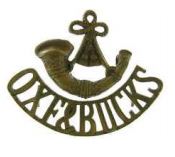Thame Remembers Corporal William Bowler

William Bowler was born on 29th January 1886, the son of Harry and Mary (nee Hollier) Bowler, and was one of their 15 children, although only 10 were still alive in 1911. His father was a carpenter, but for a short time in the 1890’s was also an innkeeper of the Red Lion Beer House in Park Street. William was living with his parents in 1911 at 74 Park Street, although they later moved to 30 Park Street.
Before the start of the Great War, William had signed up with the Oxfordshire and Buckinghamshire Light Infantry, service number 8875, and was placed on the National Reserve. In August 1914, along with several other Thame men, he was called to the colours, and left Thame to join the 3rd (Special Reserve) Battalion. In September of that year he was promoted to Lance Corporal, and to full Corporal in May 1915.
In October 1915, he was posted to France as part of a reinforcing draft to the 5th Battalion. Over the next 2 years, the battalion was in action at many of the battles of the Western Front, including the Somme in 1916, Passchendaele in 1917, and the German spring offensive in 1918.
By the end of April 1918, the 5th Battalion was reduced to cadre strength. The band, of which William Bowler was a member joined the 2/4th Battalion of the regiment on 28th May 1918.
On 5th November, just 6 days before the Armistice, William died at a casualty clearing station in the village of Awoingt, northern France, as a result of a wound received to the abdomen from the accidental discharge of a captured German revolver that was being examined by one of his fellow musicians.
He was buried in Awoingt British Cemetery.
William Bowler is remembered in Thame on the war memorial, and on the memorial boards of St Mary’s church, and All Saints church.
The Thame Remembers Cross was delivered to Awoingt British Cemetery, Nord, France
on
24th March 2015
by David & Jill Gregory





